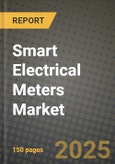The Smart Electrical Meters industrial value chains are undergoing profound transformation, influenced by the global pivot toward cleaner and more sustainable energy systems. Supply chain realignments following COVID-19 disruptions, the prolonged Russia-Ukraine conflict, escalating Middle East tensions, and volatile commodity markets are reshaping procurement strategies and investment priorities. Rising inflation, high interest rates, and the risk of regional stagflation continue to press industry players to adopt resilient and forward-looking approaches. Against this backdrop, companies in the Smart Electrical Meters sector are redesigning their operations with greater emphasis on local sourcing, digitalization, and decarbonization.
Smart Electrical Meters Market Segmentation and Growth Outlook
The Smart Electrical Meters Market research covers a detailed segmentation framework, including current market size, share, and CAGR across types, applications, and end-uses at global, regional, and country levels. Forecasts extend annually through 2034, offering visibility into long-term trends. End-use analysis highlights high-potential customer segments, while regional assessments identify emerging markets benefiting from industrial recovery, policy incentives, and green energy transitions.The research uses 2021-2023 as historical benchmarks, 2024 as the base year, and provides projections for 2025-2034. Country-level granularity enables stakeholders to benchmark performance, anticipate regulatory environments, and tailor strategies to distinct economic conditions across North America, Europe, Asia-Pacific, the Middle East & Africa, and South & Central America.
Future of the Smart Electrical Meters Market - Opportunities and Challenges
Growth momentum is expected to remain strong, propelled by decarbonization initiatives, electrification of transport, modernization of industrial processes, and increasing adoption of digital and automated solutions. The acceleration of renewable integration, grid modernization, and distributed storage is unlocking new applications for Smart Electrical Meters technologies. Expanding investments in energy transition, clean mobility, and industrial modernization programs across emerging economies are also key drivers.However, challenges persist. Heightened raw material price volatility, tightening global regulations, supply-demand imbalances, and intense competition pose risks to profitability. Geopolitical uncertainties, trade restrictions, and currency fluctuations further complicate planning. To remain competitive, players must align with sustainability standards, adapt to localized compliance regimes, and manage rising operational costs effectively.
Smart Electrical Meters Market Analytics
The report employs rigorous tools, including Porter’s Five Forces, value chain mapping, and scenario-based modeling, to assess supply-demand dynamics. Cross-sector influences from parent, derived, and substitute markets are evaluated to identify risks and opportunities. Trade and pricing analytics provide an up-to-date view of international flows, including leading exporters, importers, and regional price trends.Macroeconomic indicators, policy frameworks such as carbon pricing and energy security strategies, and evolving consumer behavior are considered in forecasting scenarios. Recent deal flows, partnerships, and technology innovations are incorporated to assess their impact on future market performance.
Smart Electrical Meters Market Competitive Intelligence
The competitive landscape is mapped through the proprietary frameworks, profiling leading companies with details on business models, product portfolios, financial performance, and strategic initiatives. Key developments such as mergers & acquisitions, technology collaborations, investment inflows, and regional expansions are analyzed for their competitive impact. The report also identifies emerging players and innovative startups contributing to market disruption.Geographic Coverage
- North America: United States, Canada, Mexico
- Europe: Germany, France, UK, Italy, Spain, Rest of Europe
- Asia-Pacific: China, India, Japan, South Korea, Australia, Rest of APAC
- Middle East & Africa: GCC, North Africa, Sub-Saharan Africa
- South & Central America: Brazil, Argentina, Rest of the region
Research Methodology
This study combines primary inputs from industry experts across the Smart Electrical Meters value chain with secondary data from associations, government publications, trade databases, and company disclosures. Proprietary modeling techniques, including data triangulation, statistical correlation, and scenario planning, are applied to deliver reliable market sizing and forecasting.Customization Options
The report can be tailored with additional modules such as:- Detailed trade & pricing analytics
- Technology adoption roadmaps and patent analysis
- PESTLE & macroeconomic impact analysis
- Country-specific forecasts and regulatory mapping
- Capital requirements, ROI models, and project feasibility studies
Key Questions Addressed
- What is the current and forecast market size of the Smart Electrical Meters industry at global, regional, and country levels?
- Which types, applications, and technologies present the highest growth potential?
- How are supply chains adapting to geopolitical and economic shocks?
- What role do policy frameworks, trade flows, and sustainability targets play in shaping demand?
- Who are the leading players, and how are their strategies evolving in the face of global uncertainty?
This product will be delivered within 1-3 business days.








